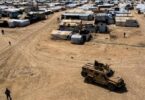BELGRADE (AA): One of the most important Ottoman mosques in Bosnia Herzegovina will be re-opened on May 4.
Located in the city of Foca in the east, the Alaca Mosque was completely destroyed by Serb forces when the city was ravished during the Bosnian War in the mid 1990s.
Known as the Pearl of Bosnia, or the beauty of Foca, Alaca Mosque has been under intense reconstruction since 2014 by Turkey’s Directorate General of Foundations.
Alaca Mosque will be opened on the eve of Bosnia’s Day of Mosques, according to a statement from the Islamic Union of Bosnia Herzegovina.
The small Balkan country, which survived massive shelling during the war, as well as massacres and the 1995 Srebrenica genocide, marks May 7 as its Day of Mosques.
“This date in a symbolical way reminds us more than a thousand mosques, prayer rooms and other charitable works, which were destroyed in the war. This year, we marking the the will have special meaning by reopening the Alaca Mosque,” said the statement.
Built in 1549 in Foca, the Alaca Mosque was among the protected cultural heritages of Bosnia Herzegovina. It is one of the first mosques built in the country with classical Ottoman architecture. It was demolished by Serb forces in 1992 by dynamite explosion.
The stones of the mosque were found at two different locations hundreds of meters away from its present site. The remains of the mosque were deliberately buried.
While there were 12 mosques in Foca before the war, all were destroyed.
According to Bosnia’s Islamic Union, 614 mosques, 218 prayer rooms, 69 Quran course sites, four dervish lodges, 37 tombs, and 405 pieces of historical heritage that belong to Muslim foundations were destroyed during the war.
Some 534 mosques in territories controlled by Serb forces were destroyed, while 80 mosques were destroyed in territories under Croat forces.
According to the union, 80 percent of the 1,144 mosques in Bosnia were destroyed or damaged. In addition to the demolished mosques and other religious buildings and more than 100 imams were killed by Serb and Croat forces.






